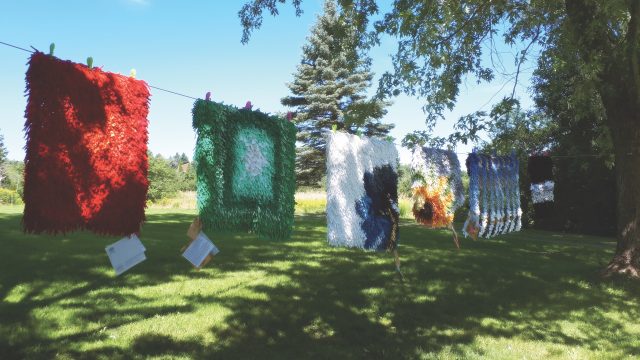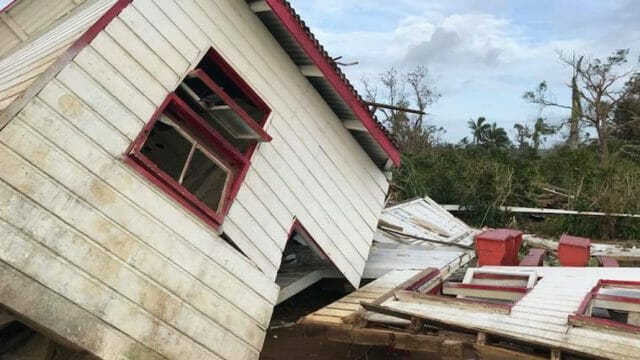The pandemic has us all in the same sinking ship, but we have a lifeline to share.

Oh, what a year it has been. This week marks one year of lockdown and working from home. When I packed my laptop, notebook, and a few folders into my workbag for the weekend, there was a rumor that we might have to close the office for a couple of weeks to let this coronavirus thing pass through, but it couldn’t be much longer than that.
As we all know, things have not transpired quite so easily.
While grateful to the essential workers who have been rooted to the frontlines of health care, food service, and so many other elements of everyday living, I don’t take lightly the fact that I’ve been able to hunker down in my home and continue working.
At first it was a nice novelty—no more heels and workwear or commuting frustrations. I could rise a little later than usual, toss on leggings and a hoody, and start the day with the entire staff in a morning Zoom meeting. We quickly found ways to accomplish our goals in strange circumstances. When printing organizations closed because of shutdowns, we found ways to pivot. We adapted to doing business virtually, as no one was ever more than a Zoom meeting or a Slack message away. We innovated and created more content than before, and quickly learned how much could be accomplished with just a laptop and a cozy corner.
But working out of the same room that I sleep, exercise, and hang out in lost its luster after Month Two. Our family social life came to a screeching halt, and we became increasingly more isolated. Initially, we were cautioned against going anywhere—parks, walking trails, even Costco, and that began to take a toll. As the scientific and medical communities learned about the virus, so did we—adapting as we went. But, tragically, we’ve all lost too many friends and loved ones along the way.
Stress Takes a Toll
This week the American Psychological Association (APA) released their annual “Stress in America” survey.* The study polled 3,000 adults about the effects of stress on their lives over the past year. Talk about a year to measure something like that!
As expected, those polled described significant challenges stemming from grief, loss, and anxiety on unprecedented levels. But in addition to mental health trials, respondents reported significant declines in their physical health. Problems with weight gain and loss, sleeping difficulties, fatigue, even digestive issues have plagued many people. Alcohol consumption, which can cause a whole other slew of issues, has increased as people sought ways to self-medicate.
A quick perusal of pandemic-related social media shows attempts at levity. Memes have encouraged us to eat whatever we want and forgive ourselves, engage in self-care without worry, and utilize creativity as an emotional outlet. But we’ve never encountered something like this before. This pandemic has completely taken life as we knew it and turned it upside down. And while a vaccine is out and restrictions are lifting, a lot of people are still suffering.
How Are We OK?
If you were to take a peek at our morning staff Zoom huddles, you’d find a group of smiling people talking, encouraging one another, cracking jokes, and praying together. Our group is not composed of folk who have remained untouched by the pandemic. Each of us has connections to people who have been seriously ill or even died from COVID-19. Each of us knows people who have lost jobs and are struggling to make ends meet. Each of us has signed off from virtual work meetings with sighs of frustration. And each of us has admitted our deep sadness over many situations associated with COVID-19.
Yet we’ve been carried through it somehow and are being carried still. This is the beauty of this faith we hold. We’ve never been alone. The Adventist movement has proven not only to be a source of emotional and spiritual encouragement during a crisis, but in this situation in particular, it has provided a blueprint for healthful living to hold on to our well-being. Any qualified medical professional will support healthful lifestyle habits that contribute to hearty immunity. And these are the very things that Adventists have always considered part of our collective value system: wholesome nutrition, fresh air and exercise, proper hydration, sleep, and spiritual care. Our church also has counsel to draw from in the writings of Ellen White, to whom health and wellness were of great importance.
No Magical Cure
This is not to say that Adventism holds some magical cure to a global pandemic. Certainly not, for Jesus Christ is the only cure to everything that ails us. But this movement has a treasure trove of solid resources from which the world can draw. Indeed, many of us have tapped into that well of knowledge to boost our wellness. But while there are those heartsick and wracked with anxiety at the rapid decline of so many elements of their world, those of us who believe carry a hope that helps us endure. While some worry that loss of health, wealth, relationships, jobs, and status dooms them to a hopeless fate, we know that the final word hasn’t yet been spoken.
Life on this earth will always be filled with pain, even as the Lord readily comes to our aid. But our faith and His Word tell us this isn’t all there is. For all who believe, the best is truly yet to come. And that is something we can share.
We have to.
* https://www.apa.org/news/press/releases/stress








